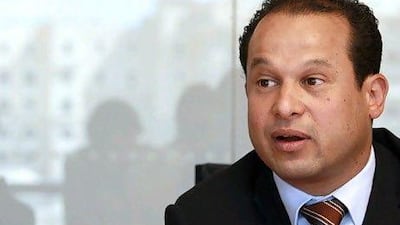Investors in defunct Abraaj Group were not told the truth about where their money was deployed or the precarious financial state of the private equity firm, a former company executive said, as he pleaded guilty to conspiracy charges in a US court.
“Put simply, money was commingled that should have been segregated, and investors were not told the truth,” said Mustafa Abdel-Wadood, a former managing partner at the Dubai-based firm, who appeared in federal court in Manhattan on Friday on charges of fraud and conspiracy .
"In raising funds, potential investors were lied to about Abraaj's financial health. "We painted a rosy picture of a prosperous firm, when, in fact, the firm was experiencing … severe liquidity issues," he added, according to a transcript of his remarks in court, seen by The National.
Mr Abdel-Wadood is one of six former Abraaj executives facing extortion and securities fraud charges following an investigation by New York prosecutors.
The 49-year-old with Egyptian and Maltese citizenships was arrested in New York in April. Since then, he has been confined to his home in the city and subject to a $10 million bail. He is the only defendant who has appeared in court in the US.
The other executives to face legal charges include Abraaj founder Arif Naqvi, who was the firm’s chief executive, as well as chief financial officer Ashish Dave and managing directors Sivendran Vettivetpillai, Rafique Lakhani and Waqar Siddique.
Abraaj, which was founded in 2002 and claimed to manage almost $14bn of assets at its peak, was the Middle East’s biggest private equity firm and one of the world’s most active emerging market investors with interests across Africa, Asia, Latin America, Turkey and the Middle East.
It was forced into liquidation in 2018 after investors including the Bill & Melinda Gates Foundation commissioned an audit to investigate alleged mismanagement of money in Abraaj’s $1bn healthcare fund.
That investigation served to deepen scrutiny of the company and allegations of misappropriation of funds secured from US investors attracted the attention of the Securities and Exchange Commission and other US authorities.
Mr Naqvi gave up control of the firm last year after it was disclosed that company revenue had failed to cover operating costs for years.
The indictment of – or legal claim against – three of the former Abraaj executives in the US, issued by the US Southern District of New York, shows they systematically tried to plug shortfalls and meet due payments by resorting to taking money in the health and other funds. When that was not enough, they planned to set up a $6bn fund, known as Fund Six, intended to help ease the liquidity crunch, according to the charges.
Mr Naqvi himself used a "variety of strategies to misappropriate cash from investors and to use it to fund cash shortfalls, thereby concealing Abraaj's true condition from investors, potential investors, creditors, and regulatory authorities," says the 78-page document, seen by The National and reported on earlier this month.
Mr Naqvi is on $20 million bail in the UK, restricted to his home and facing extradition to the US. He has refuted the charges against him and said he is innocent.
On Friday, Mr Abdul-Wadood pleaded guilty to conspiracy charges and agreed to cooperate with the US inquiry into a fundraising scheme that helped lead to the world’s biggest private-equity insolvency last year. “Some of us pushed back at Arif Naqvi’s midconduct. Too often, however, we capitulated,” he told the court on Friday. Cash shortfalls were a monthly reality, he said.
“To that end, I approved valuations that I knew were inflated and, at Naqvi’s urging, resisted attempts by others in the firm to mark down those valuations.”
Mr Abdel-Wadood could be sentenced to 125 years in prison if all the terms for each of his charges are served consecutively.
He told the court he knew at the time his conduct had been wrong, and that he “should have walked away”, but didn’t. “My commitment to Abraaj compromised the integrity of my judgement, and I ended up drifting from who I am. For that, I am ashamed,” he added, according to the transcript.
“I share responsibility for what happened and regret my involvement more deeply than anyone can imagine.”

